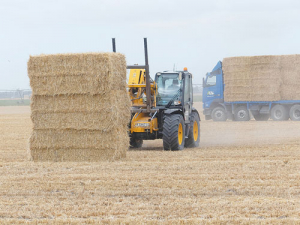Pest confirmed on West Coast
A tropical insect pest with a big appetite for corn has been identified on the West Coast, the first time it has been found in the South Island.
 A team from Southbridge-based EAL Agriservices Group loads up new season’s barley straw from a 22ha paddock on Grant and Bruce Perry’s farm at Barrhill, Mid-Canterbury. EAL boss Tim Ridgen said the straw followed a “great” crop of barley. Harvesting of autumn-sown crops is now in full swing in the province with soaring summer temperatures, although a wet early season has been blamed for a spike in fungal diseases for some. Photo: Rural News Group.
A team from Southbridge-based EAL Agriservices Group loads up new season’s barley straw from a 22ha paddock on Grant and Bruce Perry’s farm at Barrhill, Mid-Canterbury. EAL boss Tim Ridgen said the straw followed a “great” crop of barley. Harvesting of autumn-sown crops is now in full swing in the province with soaring summer temperatures, although a wet early season has been blamed for a spike in fungal diseases for some. Photo: Rural News Group.
‘Wet’ sums up the 2018-19 grain season for Canterbury, says the Foundation for Arable Research (FAR) research manager for cereals, Rob Craigie.
Rainfall through December was high in Canterbury, ranging from 62mm at Chertsey to 177mm at Methven.
Craigie said there was so much rain that trials at the FAR research site at Chertsey showed no difference in initial yields between irrigated and non-irrigated plots.
“That happens very seldom. It might be once in 10 years that you get the same yield on dry land as you would under irrigation,” he told Rural News.
“That’s on our particular soil type. It would be different on dryland farms up towards Methven where they get a bit more rain, on deeper soils.”
Craigie says it’s still early days to get a good feel for likely yields, but sunshine hours, which were needed for best yields, would also be a bit low. “We’ve done some autumn barley; I would say average to a little bit below average.”
However, the wetness has also brought more disease, with FAR receiving widespread reports of fusarium head blight (FHB), also known as head scab, in wheat crops across Canterbury.
FAR says FHB is most easily recognised on immature heads where one or more spikelets in each head appear prematurely bleached. Large areas of heads may be affected, and where infection is severe, pink or orange spore masses can be seen on diseased spikelets. Fusarium-damaged grains are pink or chalky white and shrivelled.
The disease can cause significant yield losses and some strains can produce mycotoxins.
FAR has produced a set of guidelines for harvesting fusarium-affected crops. Craigie says the main point is to set up the harvester to minimise the retention of the affected grains.
Suggested actions
- Harvest fusarium-affected wheat crops as soon as possible once ripe.
- Consult the combine manual. Combine adjustments should follow the manufacturer’s manual when first going to the field. Once in the field, operators should sample the grain and make adjustments.
- The most important adjustments include concave clearance, screen openings and cylinder and fan speeds. This is particularly important when dealing with compromised grain quality.
- Many, but not all, Fusarium-infected kernels are shrunken and have lower densities. Increasing the combine’s fan speed can greatly increase the number of lighter kernels blown out the back of the combine.
- Harvest and store fusarium-contaminated grain separately.
- Good farm practices will minimise the risk of mycotoxins. Damp grain needs to be dried to minimise risk.
The 2023-24 season has been a roller coaster ride for Waikato dairy farmers, according to Federated Farmers dairy section chair, Mathew Zonderop.
Ministry for Primary Industries (MPI) director general Ray Smith says job cuts announced this morning will not impact the way the Ministry is organised or merge business units.
Scales Corporation is acquiring a number of orchard assets from Bostock Group.
Family and solidarity shone through at the 75 years of Ferdon sale in Otorohanga last month.
The Ministry for Primary Industries (MPI) has informed staff it will cut 391 jobs following a consultation period.
New Zealand farmers are committed to making their businesses more resilient to climate change and are embracing innovation to help them do so.